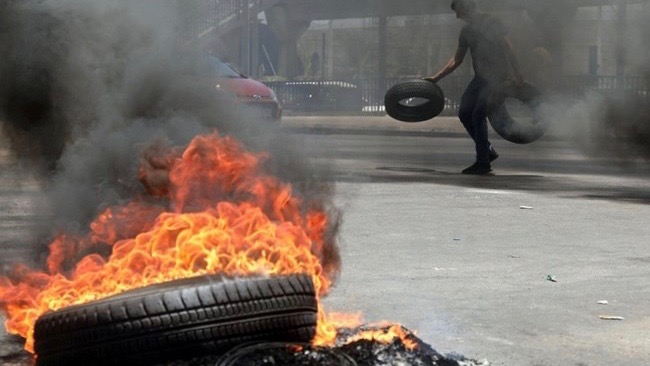Lebanese workers observed a day-long nationwide general strike on Thursday, June 17 to protest the persisting economic hardship and failure of the government to address their plight. The strike was called by the General Confederation of Lebanese Workers (CGTL), an umbrella body of trade unions in the country, and supported by some major political parties.
All commercial activities, including banks and some major oil refineries were shut, and workers blocked major roads and highways in the country. The strike also affected work at private firms and airports as employees held solidarity strikes.
Speaking to the press in capital Beirut, head of the CGTL, Bechara El-Ashmer, called for a united attempt to resolve the ongoing political and economic crisis faced by the people and the workers in Lebanon. He also called for the formation of a “salvation government” to bring back stability and redress the economic crisis.
Though the strike was effective in most places, participation of the Free Patriotic Movement (FPM), Future Movement, and Amal – political parties widely held responsible for the crisis in the country – invited some criticism. Some even called it an attempt to hijack the protest movement by the same forces responsible for the crisis.
So much ridicule in #Lebanon of a general strike tomorrow called for by establishment parties & groups responsible for the country’s collapse to protest the ongoing collapse
“We warn the forces in power that we won’t adopt their demands by way of street pressure.” https://t.co/uon1OfJGxJ
— Timour Azhari (@timourazhari) June 16, 2021
Lebanon has been facing an economic crisis since early 2019 due to systemic failures. The COVID-19 outbreak and the Beirut blast last year only compounded the crisis. The failure of the political class to form a stable government which can work towards solutions has made the situation even more complex.
There has been no full-time government in Lebanon since August last year after the then prime minister, Hasan Diab, resigned following the Beirut blast which killed over 200 people and destroyed significant parts of the city. Diab is currently the caretaker prime minister. Saad Hariri, who had to resign from the post in October 2019 following popular protests against his government’s failure to provide basic services as well as attempts to impose fresh taxes, was assigned the job of forming the new government earlier this year.
Due to disagreements on some names in his proposed cabinet, president Michael Aoun is seen to be delaying Hariri’s formal appointment as prime minister.
Meanwhile, the Lebanese currency and the value of wages in the country has fallen significantly and inflation has risen to an unprecedented level, making most essential commodities and services beyond the reach of the majority of the middle class and poorer sections. The caretaker government has proposed various cuts in subsidies, which is set to further impoverish the people. It has also failed to maintain the supply of essential services such as power and water in many localities. There is a severe lack of essential commodities such as food, medicines and fuel in the country, leading to increase in their prices.
The anti-government protests which started in October 2019 are still ongoing. The protesters have rejected most of the leadership changes proposed by the ruling establishment and instead demanded systemic changes in the country’s politics. They blame the current elite class for the pervasive economic crisis, widespread nepotism and corruption in Lebanon.





